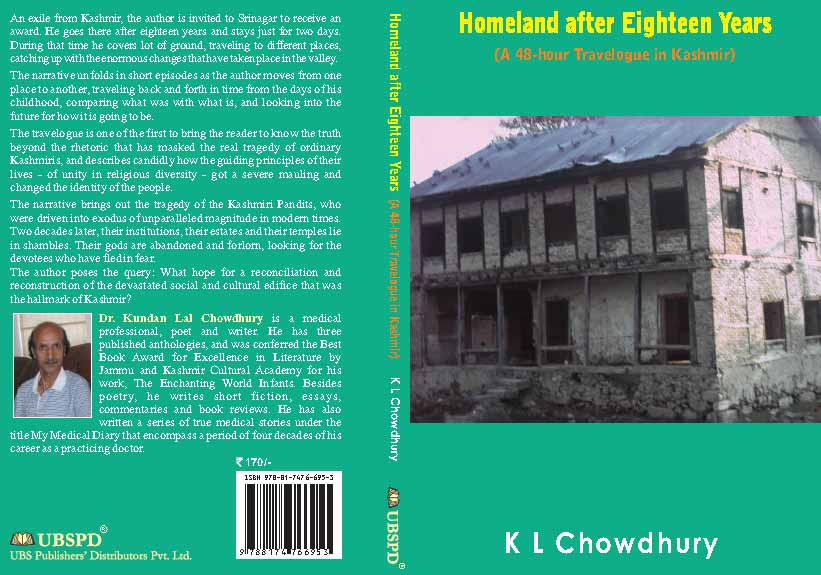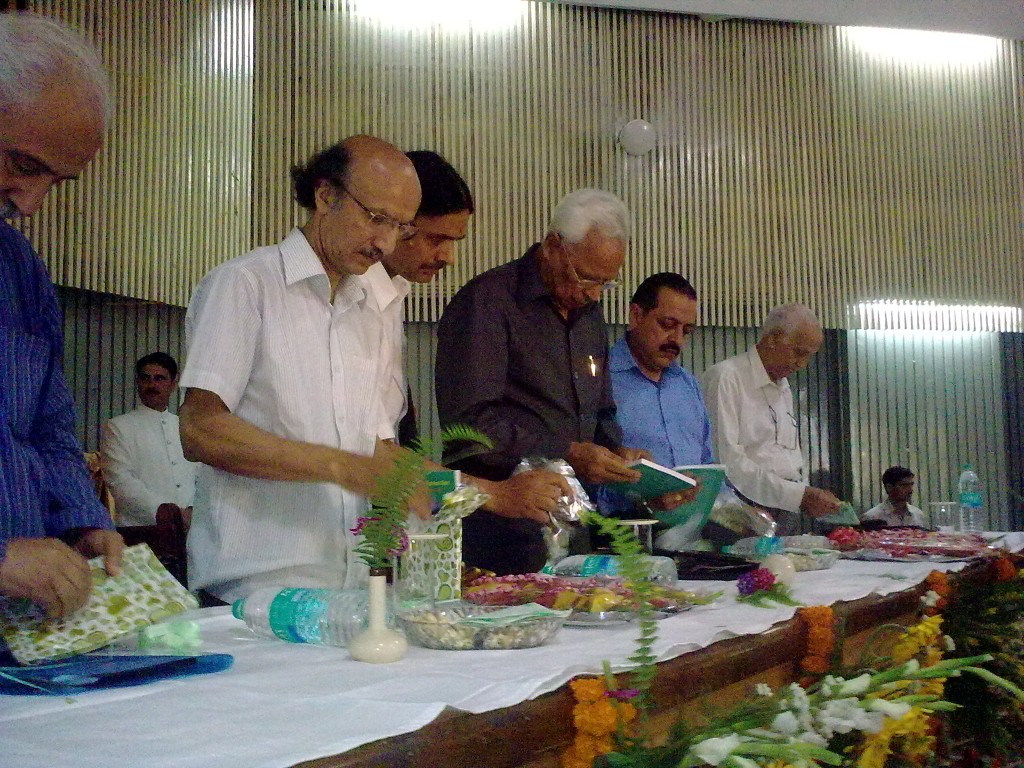Thoughts about Homeland
BOOK REVIEW
The book is a sensitively written
narrative, an account of events and experiences,
cast in a poetic mould.
Prof M L Raina
June 2011
At a subtle level of perception, the
anthology entitled “Homeland After Eighteen
years”, by Dr K L Chowdhury, seems to be a
poetic bioscope, presenting myriad scenes and
sights of the historical city of Srinagar and its
outskirts. At a subtler level, it is a work of
pure poetic magic that casts a spell on the
reader, preparing him for flights of imagination.
A powerful description of the features of the
city, enlivened with the author’s “modifying
colours of imagination” cannot but touch the
inner chords. The author lifts the reader as it
were on the “wings of poesy” to give him a
firsthand feel of what the city looks like and
what it looked like by contrast before a deep and
destabilising pall of gloom descended on it,
eclipsing its bright and beautiful looks. Creating
empathy in the reader, the author makes him walk
along with him and visit various areas of Srinagar.
In the process, he takes him up the hills and down
the dales, through the streets, big and small,
rivers and pools, lakes and gardens, high rise
buildings, dilapidated structures, malls and burnt
houses and so on and there come tumbling down on
the mind of the reader painfully pleasant
memories.

The book is a sensitively written narrative, an
account of events and experiences, cast in a
poetic mould. It is a fine blend of pathos and
subdued pleasure. The poet’s nostalgia is so
overpowering that, to quote him, “I would die to
be there again for once, if only once” and
“strong is the urge for a reunion with people
and places”. The thrill of the anticipated
reunion is, however, diluted and his bubbling
enthusiasm cooled down when he conforms the
dismally changed environs of once the “paradise
on the earth” while coursing through the city,
coupled with his ever present feeling of anguish
and pain his community members have been through,
having been driven out their ancestral land and
obliged to live as refugees outside, away from
“the ashes of their fathers and the temples of
their gods”.
Dr. Chowdhury is bitterly critical of “What
man has made of man” in the peaceful and sedate
city of yore, the pride of its people, and the
envy of the visitors from outside. He describes
painfully the scenes of the destruction of men and
material. There are flashes of several accusations
in the narrative, directed against the insensate
Jihadis, the enemies of peace, prosperity,
and the good old values of communal amity and
brotherhood, social cohesion, civilised behaviour,
and decency of attitude. This impression is
conveyed in the following lines:
‘What place for values and ideals
Where religious bigotry holds sway,
Where divisions and discord prevail
Over reason or rationality?’
Blatant hypocrisy of the Jihadis and their
sympathisers of all hues, who call themselves
devout religionists, is exposed by the author in
these lines:
‘The mandarins and ministers.
The politicians………
The high officials and the lowly workers-
One and all-
Have joined the loot’
The forced exodus of the Kashmiri Pandits, with
its pathetic consequences, is the recurring theme
of the narrative. Their pitiable condition of
uncertainty and the pain of exile find an echo in
the bard’s lament:
“We look before and after,
And pine for what is not”
When they think of the past, their raw wounds
are ripped open. When they think of the future, a
sense of dismay overtakes them, because they are
not sure of what the future holds for them. They
eagerly long for what they have been brazenly
denied at present.

All the poems in the book have a charm of their
own, but the one titled “The Audience” stands
out as a grand and sublime poetic piece, with a
profound religious import. The poet is candid
about his faith in the divine and divine
intervention. His reverential awe comes to the
fore when he looks at the stone image of his
beloved Lord Shiva in the temple of Shankaracharya.
When he approaches the idol to touch it, his hands
quiver, and an electrifying divine wave sends a
shiver through his mortal frame and he remains
immersed in ‘celestial joy’ that is marked by
inner peace. His passion for the divine embrace is
so intense that he wants to give himself up to the
divine presence, body and soul.
This, he feels intuitively, is the right place
and time for him, not to offer material oblations,
but to offer his whole being, as expressed in
these lines:
“I have come to offer myself,
My entirety,
My essence”
The author seems to firmly believe that
“there is destiny in the affairs of men”. He
says that the award ceremony at Srinagar to honour
him was an excuse, an act of divine intervention,
to grant him the long cherished prayer for
visiting his motherland. He sees destiny’s hand
in sending a doctor (the author) to the doorsteps
of the ailing priest in the temple.
The narrative, though subjective in nature, has
an air of objectivity about it, in so far as it
holds a mirror to the smeared soil of Srinagar for
all to see, including the Jihadis who perceive
beauty in every scene of ugliness. As for the
Pandits, the narrative unfolds the saga of
sufferings and deprivations they have faced. When
all this is recapitulated through the medium of
songs, they effect catharsis of their pent up
feelings and loosen their emotional baggage, thus
providing some reprieve.
The style of the narrative is marked by
lucidity of diction and felicity of expression.
The technique of moving forward and backward in
time, use of historical present to lend poignancy
to a scene depicted or a thought expressed, use of
varying rhythmical patterns of lines, to suit the
shifting events and moods, use of apt figures like
metaphors and similes, sensuous touches here and
there and above the all use of brilliant images-
all these enhance the grace of the subject matter.
Such is the poetically treatment given to an
otherwise gloomy content of the narrative that the
reader would love to read the book over and again,
for, verily “Our sweetest songs are those that
tell of the saddest thoughts.”
Source: Kashmir
Sentinel
| 